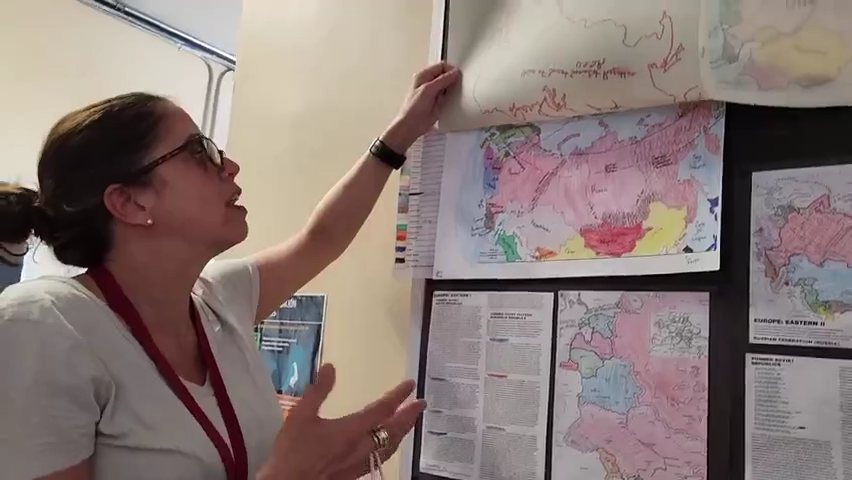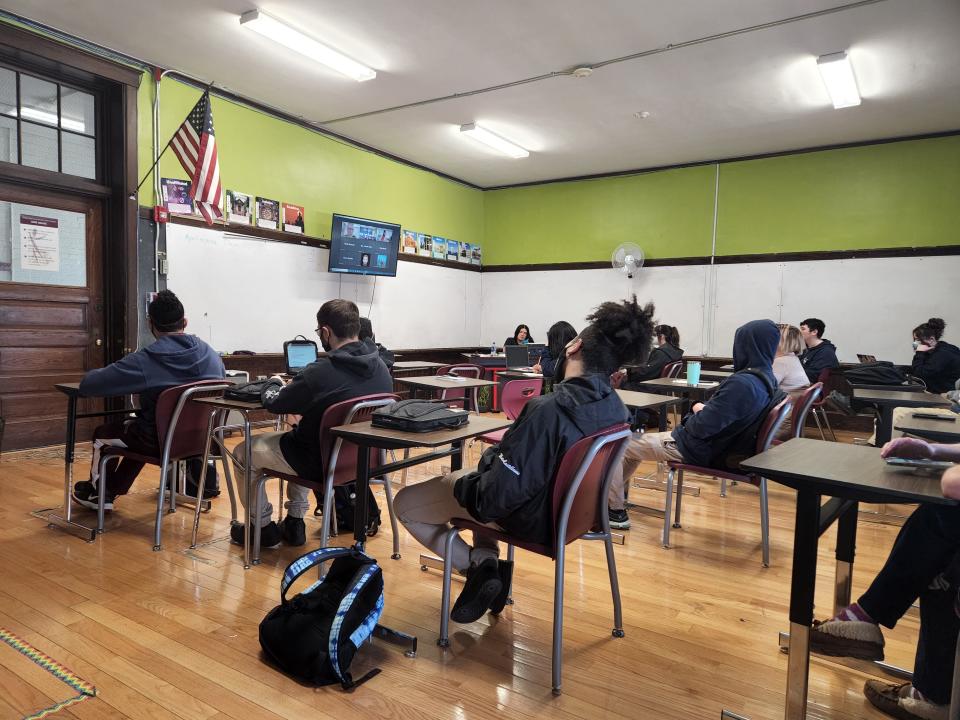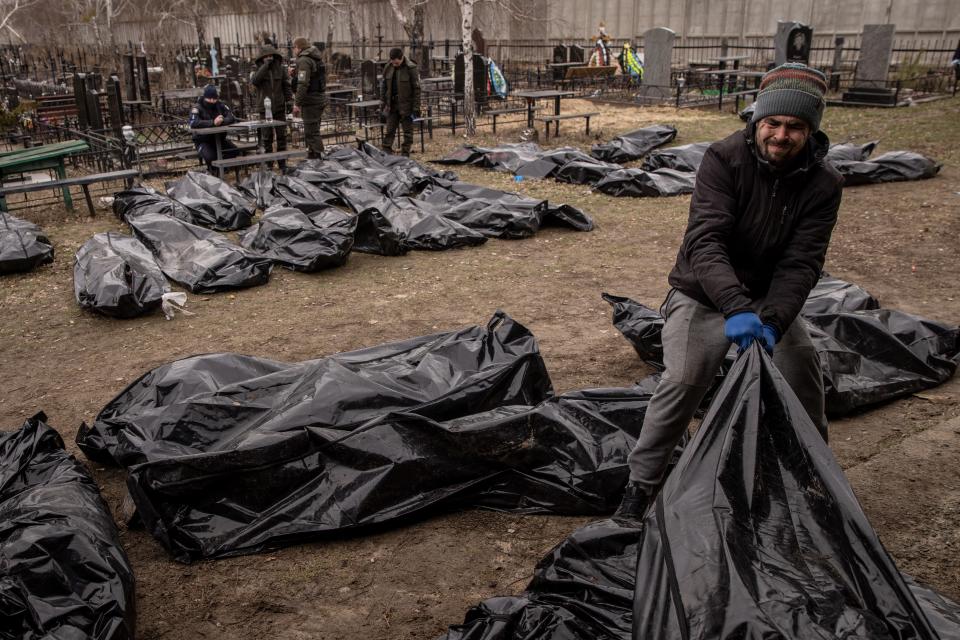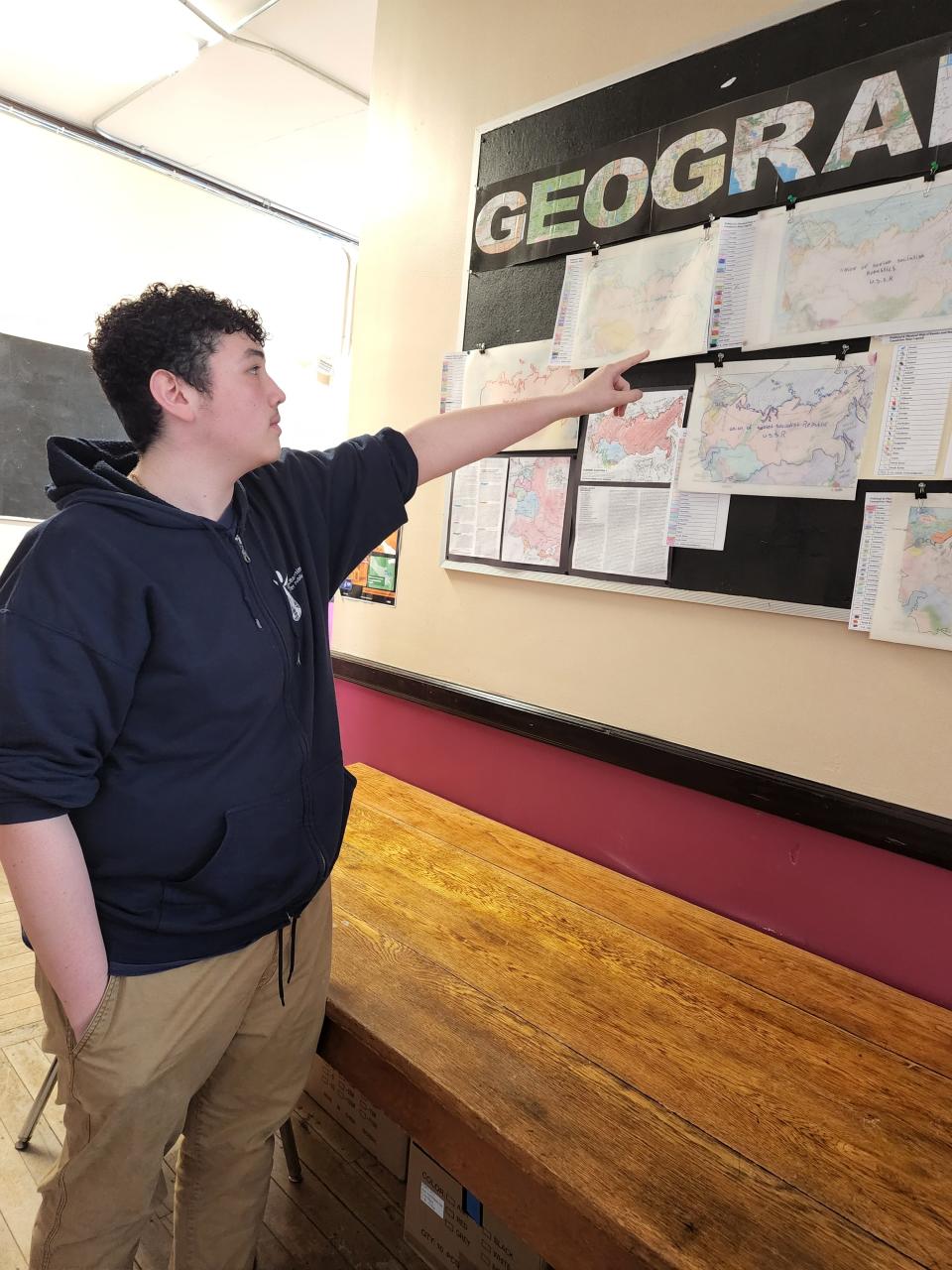'Your generation's war': How war in Ukraine is shaping New Bedford students' world views
NEW BEDFORD — History teachers start each school year knowing they will have to take students through the violence and cruelty of some of humanity's darkest hours as they build an understanding of events that have shaped today's world. But when historic events like the war in Ukraine take place in the present, the ability for those realities to hit home can feel like an elephant in the classroom.
"Usually as a history teacher you’re blissfully teaching what happened," said Global Learning Charter School history teacher Jessica Ross. "So with this, it's a strange balance to not freak everybody out and still teach the realities of what's going on."
"The years my class should normally cover are 1754 to 1919, but how do you not cover a war that's happening?" said Global Learning U.S. history teacher Erin Kochanek. "And some might be nervous to ask, but I've had this conversation with some of my students: What about a draft?"

That's why when the opportunity came up to have curious students talk to an expert in world conflicts and the type of terror tactics being used by Russia, Kochanek and Ross took it, setting up a Zoom session between their respective sophomore and junior classes and Brian Glyn Williams, UMass Dartmouth's head of Islamic studies.
Williams has worked in Afghanistan and other war zones with the U.S. military and CIA, and authored numerous books, including "Inferno in Chechnya: The Russian-Chechen Wars, the Al Qaeda Myth, and the Boston Marathon Bombings," "The Crimean Tatars: From Soviet Genocide to Putin's Conquest," and "Counter Jihad: America's Military Experience in Afghanistan, Iraq, and Syria."
Hop over: Through intricate Easter eggs, finding a connection to Ukraine — and a way to help
Horror unfiltered
"Kids your age, babies, women, children and grandmothers have been butchered, slaughtered, murdered, raped, burnt to death," Williams said, later detailing Russian soldiers' "systematic rape of Ukrainian girls as young as 14 years old ... sometimes raping them and then pouring gasoline on them and burning them alive."
"I'm sorry to be so truthful, but I think you've got to be aware of what is happening in this war," he told the students.
As he spoke to the audience of mostly 15- to 17-year-olds, the unsettling severity of violence was only one aspect of the war Williams tried to convey as he detailed events such as the now-infamously bloody occupation of the city of Bucha. Another was the scale of the war, and of the two forces involved in comparison to one another.
"We have not seen something of this magnitude in world history, in European history, since World War II," he said. "What we’re seeing in this war is extraordinary. We have a small country, Ukraine, that is invaded by the world’s largest country. Russia has 11 time zones, an army that’s 10 times the size of the Ukrainian army, and yet somehow the Ukrainians have won the first epic battle of this war — the battle to save their capital, Kyiv."
In terms of deaths, Williams said the Russian military alone has seen greater loss of life during the war so far than the U.S. ever did in both Iraq and Afghanistan combined. "The Russians have lost as many as 20,000 in just six weeks; three times as much as us in two separate countries, in 20 years...," he said.
Gain perspective: 'Threat the whole world is facing': Former Apponequet student in midst of Russia-Ukraine war
'People your age...'
In detailing the characteristics of Russia's largely tank-reliant army and how various factors — such as ally-supplied anti-tank and anti-aircraft missiles — led to the retreat of Russian forces from the area of Kyiv, Williams highlighted the important role non-military Ukrainians had in that outcome.
"A lot of women are fighting, a lot of civilians are fighting, a lot of volunteers, people your age are fighting and dying — 18-year-olds, 19-year-olds, 17-year-olds, 80-year-olds — citizens are all having this will to fight, to defend themselves, as I’m sure you would if someone invaded Massachusetts or America," he said before detailing a number of stories of civilian bravery that have come out of Ukraine in recent weeks. "Just go to YouTube and type in 'tanks Ukraine.' You're going to find so many videos Ukrainians posted of themselves … ambushing these giant Russian tanks and blowing them up."

'Everything is connected'
Williams — who dropped into the New Bedford classrooms virtually from Brasilia, Brazil, where he has completed his latest book — says the recent candid chat with students reflects the nature of much of his work, as he aims to recognize the historic significance of events as they're happening and harness any lessons they have to offer sooner rather than later.
Read up: Afghan Refugees call New Bedford Home
"I try to go into the white noise and the blitz of constantly unfolding news stories and try to make history unfolding on shifting sand into comprehensible concrete history," Williams told The Standard-Times. "I find that events like this, as tragic as they are, really are a true mind-opening learning opportunity."
As Ross and her students watch the war play out day after day, she has observed them making connections between what they learn in class and their everyday lives.

"This is a junior class, so most of them are driving and they're noticing the gas prices going up; and some of them work at Market Basket and some of the other stores so they hear customers complaining about the prices of things going up," Ross said of her world history students. "We've talked a lot this year about economics and supply chain, so I think for this age group especially, many of them are making these connections and realizing 'yikes — the real world is coming up fast.'"
"Plus they also all have phones," added Kochanek, "so they’re seeing this on social media platforms, they see videos, and then they ask questions about what they're seeing. I've had students come in asking about things like what happened in Bucha and it can lead to some difficult conversations — but they're important to have."
See local news: Police investigate New Bedford homicide; neighbors say 10 shots fired
Considering the timing of the war in Ukraine relative to the COVID-19 outbreak of 2020, Ross pointed out that current generations of high schoolers have a heightened level of experience learning about historic events in real time, and says she has noticed the impact this can have on students' understandings of related topics. "I would say it feels different to talk to kids who’ve lived through a global pandemic when we cover the bubonic plague and things like that," she said. "They have much more insight now so discussions were different than they've been in previous years."
"Following what's happening in Ukraine this closely, I think it gives you more of a sense of how someone who was alive during World War I or World War II felt during that time," said Global Learning 11th grader, Ty Velez, 17. "And then there's things that I probably wouldn’t have considered, like how gas prices can be affected by war. So you get a sense of how much everything is connected."

Another Global junior, Joel Trubi Nunez, 17, reflected back to what he has learned about Josef Mengele, the Nazi doctor who became infamous for his excruciatingly torturous experiments on Auschwitz prisoners during World War II.
"It's like how Putin has all the power to limit communications so people can't describe to the world what's going on in Russia," he said before mentioning news he remembered hearing of a U.S. citizen currently imprisoned in Russia. "Since Hitler had all the power in Germany and did all those experiments, we don't know what Putin might be doing to people."
See what's coming: New Bedford Mayor Jon Mitchell delivers State of the City Address
'Mastering' the facts
Williams — who says he's currently partnering with Jim Marshall of New Bedford Cable Access on a documentary about the war — is pleased that young people in the U.S. have been showing a desire to understand the situation in Ukraine; or, as he put it to the students during their Zoom session, to gain a "mastery" of the knowledge involved.
"I hope you go out and tell people about this. I hope you become the first ones in your neighborhood, your friends group, your family, to master your generation’s war," he said, "because this war will go on for a long time, sadly, I believe."
Some of Williams' other recent programming on the war in Ukraine includes a public Q&A session, and a program titled "Understanding the Ukraine War With Professor Brian Glyn Williams: Javelins, Oligarchs and Sanctions"
This article originally appeared on Standard-Times: New Bedford students, educators talk about Ukraine's impact in class

